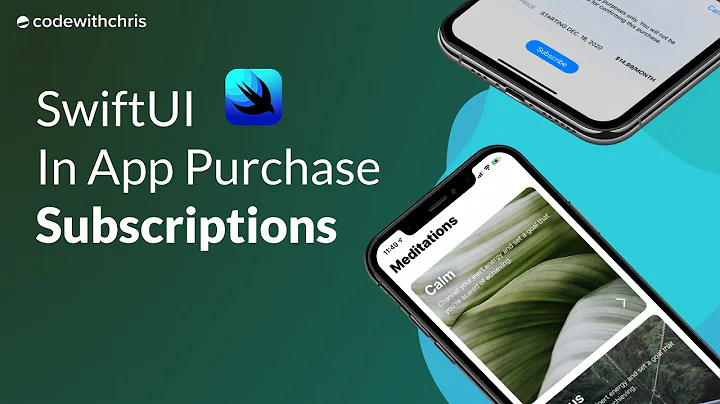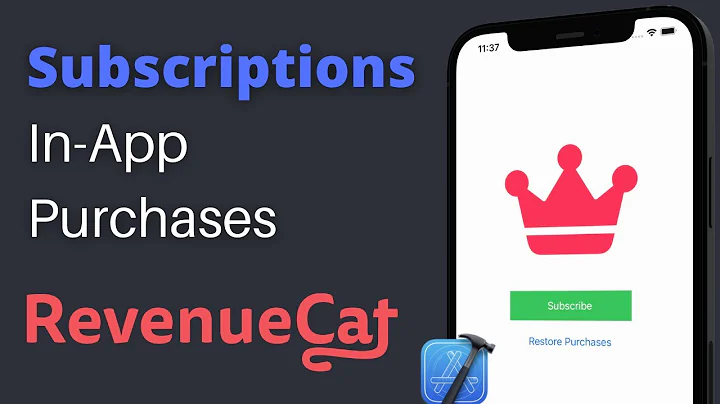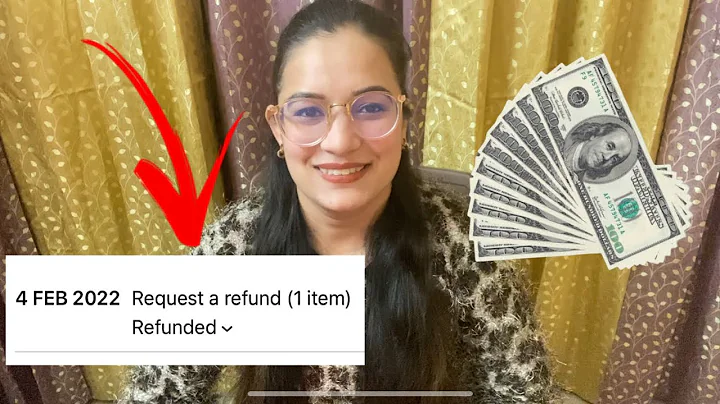iOS in-app purchase subscription get free trial period length from SKProduct
Solution 1
I've solved it using DateComponentsFormatter, that saves you a lot of time localizing in different languages and handling plurals and whatnot. This might seem like a lot of code, but I hope it will save me time in the future.
import Foundation
class PeriodFormatter {
static var componentFormatter: DateComponentsFormatter {
let formatter = DateComponentsFormatter()
formatter.maximumUnitCount = 1
formatter.unitsStyle = .full
formatter.zeroFormattingBehavior = .dropAll
return formatter
}
static func format(unit: NSCalendar.Unit, numberOfUnits: Int) -> String? {
var dateComponents = DateComponents()
dateComponents.calendar = Calendar.current
componentFormatter.allowedUnits = [unit]
switch unit {
case .day:
dateComponents.setValue(numberOfUnits, for: .day)
case .weekOfMonth:
dateComponents.setValue(numberOfUnits, for: .weekOfMonth)
case .month:
dateComponents.setValue(numberOfUnits, for: .month)
case .year:
dateComponents.setValue(numberOfUnits, for: .year)
default:
return nil
}
return componentFormatter.string(from: dateComponents)
}
}
It requires to convert the SKProduct period unit into a NSCalendarUnit
import StoreKit
@available(iOS 11.2, *)
extension SKProduct.PeriodUnit {
func toCalendarUnit() -> NSCalendar.Unit {
switch self {
case .day:
return .day
case .month:
return .month
case .week:
return .weekOfMonth
case .year:
return .year
@unknown default:
debugPrint("Unknown period unit")
}
return .day
}
}
And you can call it from a SubscriptionPeriod like this:
import StoreKit
@available(iOS 11.2, *)
extension SKProductSubscriptionPeriod {
func localizedPeriod() -> String? {
return PeriodFormatter.format(unit: unit.toCalendarUnit(), numberOfUnits: numberOfUnits)
}
}
Which you can in turn call from a SKProductDiscount like so. Please note I didn't implement the other PaymentModes for now.
import StoreKit
@available(iOS 11.2, *)
extension SKProductDiscount {
func localizedDiscount() -> String? {
switch paymentMode {
case PaymentMode.freeTrial:
return "Free trial for \(subscriptionPeriod.localizedPeriod() ?? "a period")"
default:
return nil
}
}
}
Solution 2
You can get it, but as mentioned above it works only starting from iOS 11.2, for other versions you'll have to get it from your server via API.
Here is an example code that I've used:
if #available(iOS 11.2, *) {
if let period = prod.introductoryPrice?.subscriptionPeriod {
print("Start your \(period.numberOfUnits) \(unitName(unitRawValue: period.unit.rawValue)) free trial")
}
} else {
// Fallback on earlier versions
// Get it from your server via API
}
func unitName(unitRawValue:UInt) -> String {
switch unitRawValue {
case 0: return "days"
case 1: return "weeks"
case 2: return "months"
case 3: return "years"
default: return ""
}
}
Solution 3
Using Eslam's answer as inspiration I created an extension to SKProduct.PeriodUnit
extension SKProduct.PeriodUnit {
func description(capitalizeFirstLetter: Bool = false, numberOfUnits: Int? = nil) -> String {
let period:String = {
switch self {
case .day: return "day"
case .week: return "week"
case .month: return "month"
case .year: return "year"
}
}()
var numUnits = ""
var plural = ""
if let numberOfUnits = numberOfUnits {
numUnits = "\(numberOfUnits) " // Add space for formatting
plural = numberOfUnits > 1 ? "s" : ""
}
return "\(numUnits)\(capitalizeFirstLetter ? period.capitalized : period)\(plural)"
}
}
To use:
if #available(iOS 11.2, *),
let period = prod?.introductoryPrice?.subscriptionPeriod
{
let desc = period.unit.description(capitalizeFirstLetter: true, numberOfUnits: period.numberOfUnits)
} else {
// Fallback
}
This will create a nicely formatted string (e.g. 1 day, 1 Week, 2 months, 2 Years)
Solution 4
Nice one @scott Wood. I would make it a property of SKProduct.PeriodUnit instead of a function. That would keep the behaviour more consistent with enums:
@available(iOS 11.2, *)
extension SKProduct.PeriodUnit {
var description: String {
switch self {
case .day: return "day"
case .week: return "week"
case .month: return "month"
case .year: return "year"
// support for future values
default:
return "N/A"
}
}
func pluralisedDescription(length: Int) -> String {
let lengthAndDescription = length.description + " " + self.description
let plural = length > 1 ? lengthAndDescription + "s" : lengthAndDescription
return plural
}
}
And then a function to return the plural, based on the description property.
And yes, as someone else pointed out, you should localise the plurals if your app is available in other languages.
Related videos on Youtube
Comments
-
mjpablo23 almost 2 years
I am working on in-app purchases with subscriptions. In swift, you can get price and price locale from the SKProduct like so:
weeklyProduct.price.doubleValue weeklyProduct.priceLocale.currencySymbolwhere weeklyProduct is a SKProduct.
Is it possible to get the free trial length? For example, I specified a two week free trial for the product. can I get this from the SKProduct?
-
 Paulw11 over 6 yearsNo. You can get information from the receipt that indicates whether the subscription is currently in the free trial period, but not the free trial length
Paulw11 over 6 yearsNo. You can get information from the receipt that indicates whether the subscription is currently in the free trial period, but not the free trial length -
mjpablo23 over 6 yearsah ok, thanks. got it.
-
-
vmeyer over 5 yearsGreat answer. If you want to localise, use stringdicts instead of
pluralvariable : developer.apple.com/library/archive/documentation/MacOSX/… -
 Niels Mouthaan over 3 yearsThe most elegant solution as it properly takes into account localization.
Niels Mouthaan over 3 yearsThe most elegant solution as it properly takes into account localization.











